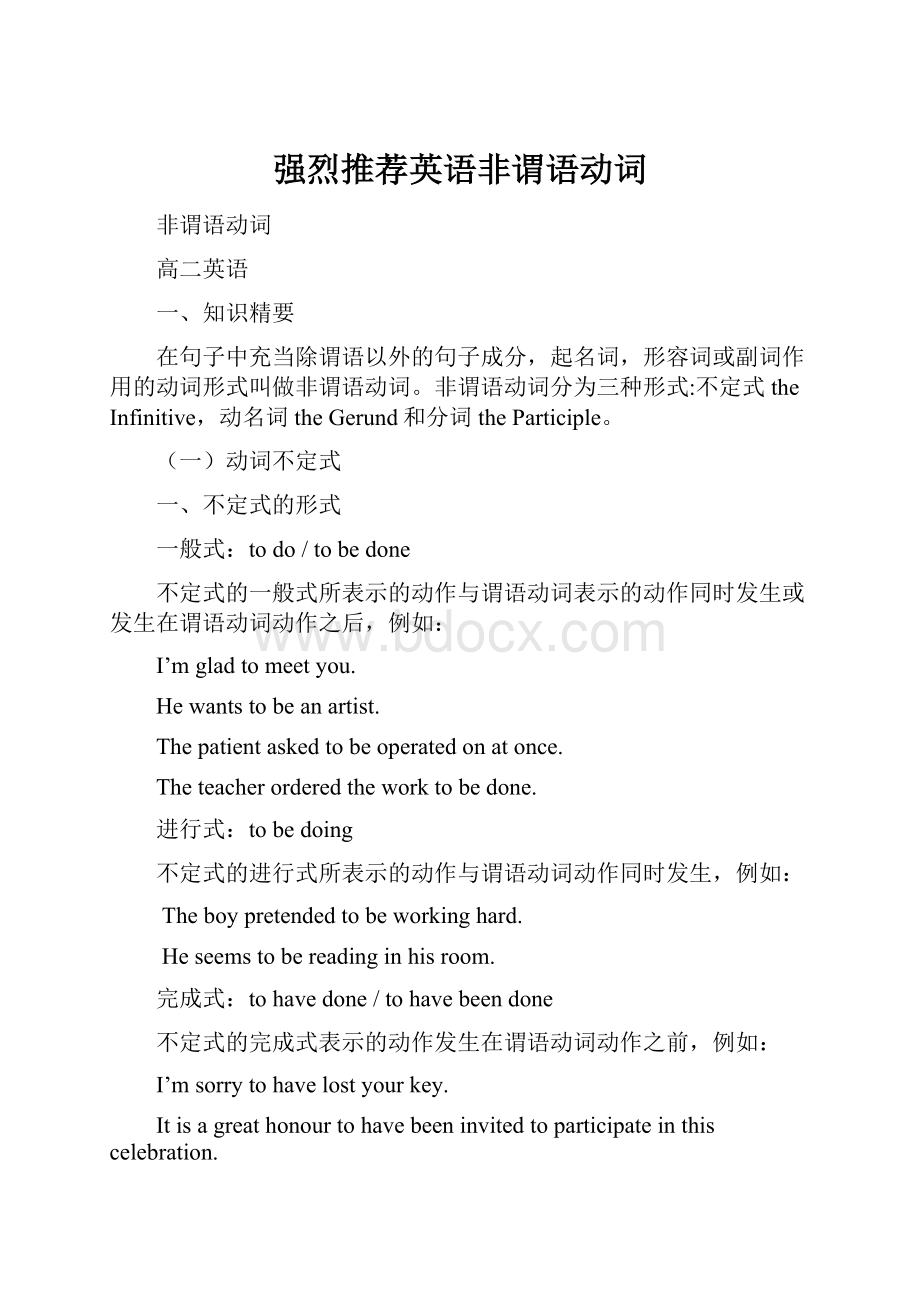强烈推荐英语非谓语动词.docx
《强烈推荐英语非谓语动词.docx》由会员分享,可在线阅读,更多相关《强烈推荐英语非谓语动词.docx(27页珍藏版)》请在冰豆网上搜索。

强烈推荐英语非谓语动词
非谓语动词
高二英语
一、知识精要
在句子中充当除谓语以外的句子成分,起名词,形容词或副词作用的动词形式叫做非谓语动词。
非谓语动词分为三种形式:
不定式theInfinitive,动名词theGerund和分词theParticiple。
(一)动词不定式
一、不定式的形式
一般式:
todo/tobedone
不定式的一般式所表示的动作与谓语动词表示的动作同时发生或发生在谓语动词动作之后,例如:
I’mgladtomeetyou.
Hewantstobeanartist.
Thepatientaskedtobeoperatedonatonce.
Theteacherorderedtheworktobedone.
进行式:
tobedoing
不定式的进行式所表示的动作与谓语动词动作同时发生,例如:
Theboypretendedtobeworkinghard.
Heseemstobereadinginhisroom.
完成式:
tohavedone/tohavebeendone
不定式的完成式表示的动作发生在谓语动词动作之前,例如:
I’msorrytohavelostyourkey.
Itisagreathonourtohavebeeninvitedtoparticipateinthiscelebration.
否定式:
not+(to)do
二、不定式的句法功能
动词不定式除了不能单独作谓语外,几乎能充当句子中所有的句子成分。
1.不定式做主语:
(1)Tofinishtheworkintenminutesisveryhard.
Toloseheartmeansfailure.
动词不定式(短语)作主语时,常用it代替它作形式主语,例如上面两句可用如下形式:
Itisveryhardtofinishtheworkintenminutes.
Itmeansfailuretoloseheart.
(2)不定式和动名词做主语的区别:
动名词做主语往往表示普通的、一般的行为,在意义上是比较抽象的、一般的,时间概念不强,不是指某一次的动作;不定式做主语常表示某次具体的行为。
例如:
Doingsportsisgoodforpeople’shealth.
Todotoomuchexerciseisnotgoodforhimashehasaheartillness.
2.不定式作表语
(1)表示主语的具体内容。
Hiswishistobecomeascientist.
Thedutyofapostmanistodeliverlettersandnewspapers.
注意:
主语部分有实义动词do时,表语中可以省略to。
Whathedidfirstwas(to)walkuptohisfriendandhughim.
(2)“betodo”还可以表示不同的情态意义。
Childrenarenottosmoke.(禁止)
Theyaretomarrynextweek.(安排)
Youmustbepatientandpersistentifyouaretosucceed.(愿望)
Manistoliveabetterlifeinthenextcentury.(事态发展或预期的结果)
注意
有几个不定式作表语,需用主动表被动:
Parentsaretoblameiftheirchildrendonothavegoodmanners.
Thehouseistolet.该房屋出租。
3.不定式做宾语
(1)接不定式做宾语的常见动词:
afford,agree,aim,appear,arrange,begin,choose,come,dare,decide,demand,desire,determine,expect,fail,happen,help,hope,learn,long,manage,offer,plan,prepare,pretend,promise,refuse,seem,tend,want,wish
注意:
demand/hope只能接todo不能接sbtodo。
(2)一些动词要用疑问词+不定式作宾语。
常见的动词有:
decide,know,learn,wonder,findout,remember,see等。
Idon’tknowhowtodoit.
Ihaven’tdecidedwhethertosellitornot.
(3)feel,find,judge,make,think,believe,consider等动词后如果是不定式作宾语,补语是形容词(间或是名词),常用it作形式宾语,把不定式后移。
Ithoughtitagreatpitynottohaveinvitedher.
Ifindithardtoworkwithhim.
(4)在表示“希望、打算”等动词(如hope,expect,intend,mean,want等)的过去式后,可接动词不定式的完成式来表示没有实现的动作。
Wemeanttohavestayedthereaweek.(=Wehadmeanttostaythereaweek.)
(5)在介词but和except后的动词形式:
在这种句式中,如介词前有实义动词do,后面接不带to的不定式;如果是其他动词,则
接带to不定式。
OnthatrainynightIhadnothingtodobutstayinmycar.
Hedidn’tsayawordbuttolisten.
(6)作形容词的宾语
①句子的主语是不定式的逻辑主语。
Johnwashappytobegiventhejob.
②句子的主语是不定式的逻辑宾语。
This problem is easy to solve.
She is hard/difficult to get along with.
Thechairiscomfortabletositon.
Heispleasanttoworkwith.
即在easy,hard,difficult,pleasant,interesting等形容词后的不定式用主动形式表示被动含义。
4.不定式作宾语补足语
(1)v.+sb.+todo
常见动词:
allow,ask,advise,beg,cause,encourage,expect,forbid,force,get,order,permit,persuade,teach,tell,want,warn,wish
(2)v.+sb./sth.+tobe
believe,consider,find,feel,imagine,judge,know,prove,think,suppose,understand
Hejudgedhertobeathief.
(3)v.+sb./sth.+do
感觉动词和使役动词与不带to的不定式连用,但这种句式在变为被动语态时应带to。
如see,watch,notice,hear,make,have,let等。
Thoughhehadoftenmadehislittlesistercry,todayhewasmadetocrybyhislittlesister.
(4)helpsb.(to)do
I’dliketohelphim(to)workouttheproblem.
5.不定式作定语
(1)不定式可以修饰作主语的名词,相当于一个定语从句,表明动作即将发生。
Theconferencetotakeplacenextmonthwillcertainlybeagreatsuccess.
(=Theconferencewhichwilltakeplace…)
(2)动词不定式作定语,放在所修饰的名词或代词后。
与所修饰词有如下关系:
①动宾关系。
Ihavemuchtodo.
Ihaveaquestiontoask.
如果该不定式是不及物动词,其后应有必要的介词。
Shehasabighousetolivein.
Thelonelymanhasnoonetotalkto.
但:
Shehasnoplacetolive.
②主谓关系。
此时被修饰词常为:
thefirst,thesecond,thelast,thebest,theonlything等常跟不定式作定语。
Heisalwaysthefirsttocome.
Heistheonlyonetopasstheexam.
③同位关系。
表示被修饰词的具体内容。
Ilosttheopportunitytogivemyopiniononit.
Somechildrenhadnochancetogotoschool.
6.不定式做状语
(1)表示目的。
不定式作目的状语时,其动作发生在谓语动词所表示的动作之后,一般放在句子后部。
但如要表示强调,也可以位于句首,前面可加inorder,但不能用soas。
其否定式不能用not+todo,必须用inordernot+todo或soasnottodo。
Iopenedthewindowtoletsomefreshairin.
Inordertocatchthetrain,theytookataxi.
Let’shurrysoasnottobelateforthemeeting.
注意:
在英语中,目的一般用不定式表示,不用for+doing这一形式。
Weeattolive.(不用fordoing)
(2)作结果状语。
WhathaveIsaidtomakeyousoangry?
不定式表示结果常见于下列句型:
onlytodo;so…astodo;such…astodo;enoughtodo;too…todo。
Thenewsreportershurriedtotheairport,onlytobetoldthefilmstarshadleft.(表示该结
果出乎意料)
Wouldyoubesokindastohelpmecarrythebigbagforme?
下列形容词是对人进行表扬或批评的,后面常接不定式表示结果:
nice,polite,generous,
kind,selfish,silly等。
Youweresillynottohavelockedyourcar.
Heisgeneroustolendusalargesumofmoney.
(3)表示原因。
常表示引发某种情绪的原因。
I’mhappytoseethat.
Weweresurprisedtohearthenews.
(4)表明说话人的态度,在句中作独立成分。
Totellyouthetruth,Idon’tlikethewayhetalked.
三、动词不定式的逻辑主语
1.句子的主语就是不定式的逻辑主语。
Ihavemuchtodo.
2.当句子的主语不是不定式的逻辑主语时,需要加上逻辑主语。
在It’s+adj.+forsb.todosth.结构中,形容词往往表示事物的性质。
ItisimportantforustostudyEnglish.
Itiseasyforustogetthelatestinformation.
在It’s+adj.+ofsb.+todosth.结构中,形容词通常表示人物的性格和特征。
It’sniceofyoutogivemesomuchhelp.(=Youarenicetogivemesomuchhelp.)
四、补充句型
1.主语+besaid/reported/believed/thought/considered…+todo
Heissaidtohavetraveledtomanycountries.
(=Itissaidthathehastravelledtomanycountries.)
Thispopgroupisbelievedtobethebestofthisyear.
(=Itisbelievedthatthispopgroupisthebestofthisyear.)
2.Thereisnoneed+todo
Thereisnoneedtosufferinsilence.
(二)动名词
一、动名词的形式
一般式:
doing/beingdone
Mr.GreenfailedtocatchtheplanetoMexico,soheescapedbeingkilledintheplanecrash.
完成式:
havingdone/havingbeendone
Havingstudiedcomputerisanimportantqualificationforthejob.
否定式:
not+动名词
二、动名词的句法功能
动名词具有名词词性,在句子中可以作主语、宾语、表语和定语。
1.作主语
Shakingone’sheadmeans“no”andnoddingmeans“yes”.
动名词作主语,有时也会用it作形式主语:
It’snousecryingoverspiltmilk.
It’snogooddrinkingtoomuchalcohol.
2.作表语
Myjobisteaching.
YourtaskislearningEnglishwell.
一般,主语与表语可互换。
Teachingismyjob.
LearningEnglishwellisyourtask.
3.作宾语
(1)动词宾语:
有些动词后加动词的动名词形式作宾语。
常见动词包括:
admit,advise,allow,appreciate,avoid,consider,delay,deny,enjoy,escape,encourage,finish,forbid,imagine,keep,mention,mind,miss,practice,permit,resist,risk,suggest,understand等,其中有些可用sb./sth.doing结构。
注意
①其中advise,allow,forbid,encourage,permit可用不定式作宾语补足语。
Wedon’tallowsmokingintheoffice.
Wedon’tallowthemtosmokeintheoffice.
②主语+need/want/requiredoing,意思是“主语需要被…”
Theflowerswantwatering.(=Theflowerswanttobewatered.)
Ourhouseneedsrepairing.(=Ourhouseneedstoberepaired.)
③有些动词后面既可以接动名词,也可以接不定式作宾语。
意义基本相同的:
begin,continue,start,love,like,hate,prefer,stand
意义不同的:
forget,remember,regret,stop,goon,try,mean,can’thelp
(2)动词短语的宾语
bebusy,beworth,can’thelp,endup,feellike,giveup等。
(3)介词短语
spendtime(in)doingsth,havedifficulty/trouble(in)doingsth,haveahardtime(in)doingsth
注意:
下列短语中的to是介词,而不是动词不定式符号,因此后面要接动词的动名词形式。
beusedto,devoteoneselfto,getdownto,leadto,lookforwardto,makeacontributionto,objectto,payattentionto,preferdoingtodoing,stickto
Mrs.Wangdevotedherselftoprotectingwildlife.
I’mlookingforwardtohearingfromyou.
4.作定语
表示被修饰词的用途
awalkingstick,awashingmachine,awaitingroom,adressingmirror
三、动名词的逻辑主语
1.当动名词作主语时,其逻辑主语应为所有格形式。
Tom’s/Hiscomingmademeveryexcited.
2.当动名词作宾语时,其逻辑主语可为所有格或普通格。
Doyoumindhim/his/Tom’s/Tomsittinghere?
注:
当逻辑主语为无生命的东西时,用普通格。
Canyouimagineaplanedroppingdownontheroofofahouse?
(三)分词
一、现在分词和过去分词的区别
现在分词的基本意义
过去分词的基本意义
1.主动语态,即与被修饰词构成主动关系。
1.被动语态,即与被修饰词构成被动关系。
2.进行时态,即表示动作正在进行、即将发生或表示某个状态。
2.完成时态,即表示已经完成的动作或所处的状态。
现在分词的形式
过去分词的形式
doing/beingdone
done
havingdone/havingbeendone
现在分词的形式
过去分词的形式
doing/beingdone
done
havingdone/havingbeendone
现在分词的形式
过去分词的形式
doing/beingdone
done
havingdone/havingbeendone
现在分词的形式
过去分词的形式
doing/beingdone
done
havingdone/havingbeendone
Canyouseethestarmovinginthesky?
Doyouknowthenumberofpeoplecomingtotheparty?
Thereisapianostandinginthecorner.
IsthisthebookwrittenbyHenry?
Dressedinwhite,shesuddenlyappeared.
二、分词的形式
现在分词的形式
过去分词的形式
doing/beingdone
done
havingdone/havingbeendone
1.现在分词的形式
(1)现在分词的主动语态:
一般式:
现在分词表示的动作与谓语动词所表示的动作同时发生。
完成式:
现在分词表示的动作在谓语动词所表示的动作之前发生,常作状语。
Theywenttothepark,singingandtalking.
Havingdonehishomework,heplayedbasketball.
(2)现在分词的被动语态:
一般式:
表示与谓语动词同时发生的被动的动作。
完成式:
表示发生在谓语动词之前的被动的动作。
Theproblembeingdiscussedisveryimportant.
Havingbeentoldmanytimes,thenaughtyboymadethesamemistake.
(3)否定式:
not+现在分词
2.过去分词的形式:
过去分词只有done这一种形式,表示已经完成的动作或所处的状态。
Lostindeepthought,hedidn’thearthesound.
三、分词的句法功能
具有形容词和副词词性。
因此在句子中可以充当:
定语、状语、表语、宾语补足语。
但:
现在分词的完成式(即havingdone/havingbeendone)通常作状语。
Havingbeeninbedforthreedays,hewassenttohospital.
Sheisthegirlhavingamazedmewithhertalent.(×)
1.作表语
分词作表语相当于形容词
现在分词:
表示主语所具有的特征;“令人……的”
过去分词:
表示主语所处的状态;“感到……的”
Thebookinterestsme.(Thebook动作发出者;me动作承受者)
Thebookisinteresting.
Iaminterestedinthebook.
2.作定语
English-speakingcountriesspokenEnglish
当分词动作与被修饰词是主动关系,用现在分词;如果是被动关系,用过去分词。
另外,不及物动词的分词形式作定语时,现在分词表示